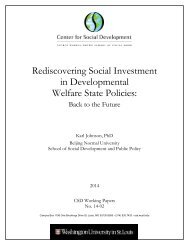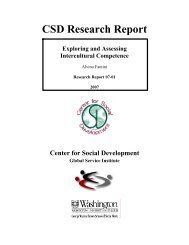Perceived Effects of International Volunteering - Center for Social ...
Perceived Effects of International Volunteering - Center for Social ...
Perceived Effects of International Volunteering - Center for Social ...
Create successful ePaper yourself
Turn your PDF publications into a flip-book with our unique Google optimized e-Paper software.
this study explicitly aim to achieve these objectives. Volunteer organizations designed to achieve<br />
these specific objectives may realize more effective results in these areas.<br />
<strong>Perceived</strong> Overall Effectiveness3<br />
In addition to rating their perceived effectiveness in particular activity areas, the survey also asked<br />
alumni to rate whether they were generally helpful to the host organization or community. Twentyfive<br />
percent <strong>of</strong> volunteers believed that if they had not volunteered, then a local staff member would<br />
have provided these services, but only 11 percent <strong>of</strong> volunteers believed that their services may have<br />
been provided more effectively by a local staff member. In some cases, this may be directly related<br />
Average agreement<br />
Figure 3: <strong>Perceived</strong> Effectiveness<br />
Reported by Alumni N = 284) i<br />
6<br />
5<br />
4<br />
3<br />
2<br />
1<br />
0<br />
I had a specific,<br />
needed skill<br />
I transferred<br />
useful skills<br />
i Duration <strong>of</strong> placement varies: CCS = 6.1 weeks,<br />
WorldTeach = 43.1 weeks<br />
WorldTeach<br />
CCS<br />
I made a lasting<br />
contribution<br />
C ENTER FOR S OCIAL D EVELOPMENT<br />
W ASHINGTON U NIVERSITY IN S T . L OUIS<br />
to the type <strong>of</strong> services volunteers<br />
provide. As one volunteer elaborated, “I<br />
think my job could have been filled<br />
equally effectively by another native<br />
English speaker, but it would not have<br />
been effectively filled by a worker from<br />
the host country.” Volunteers perceived<br />
they were particularly effective when<br />
local staff did not have the skills to meet<br />
the specific demand <strong>for</strong> services.<br />
The vast majority <strong>of</strong> alumni (76 percent)<br />
believed they made a lasting contribution<br />
to the host organization or community.<br />
Sixty-nine percent believed they had a<br />
specific skill needed by the host<br />
organization, and 70 percent believed<br />
they transferred a useful skill to the host<br />
organization.<br />
Alumni from the two organizations varied in their agreement with these items, however.<br />
WorldTeach alumni were more likely than CCS alumni to agree that they provided skills and<br />
contributions to the organization or host community (see Figure 3). 23<br />
This finding could also be an<br />
artifact <strong>of</strong> inherent differences between the aims and structure <strong>of</strong> the two models. WorldTeach<br />
volunteers are in the community <strong>for</strong> a longer duration, are highly integrated, and frequently speak<br />
the host-country language. These qualities provide volunteers more opportunities to transfer skills to<br />
those in the host country.<br />
23 For all three items measuring general effectiveness, t > 4.4, df = 270, p < 0.001<br />
20
















